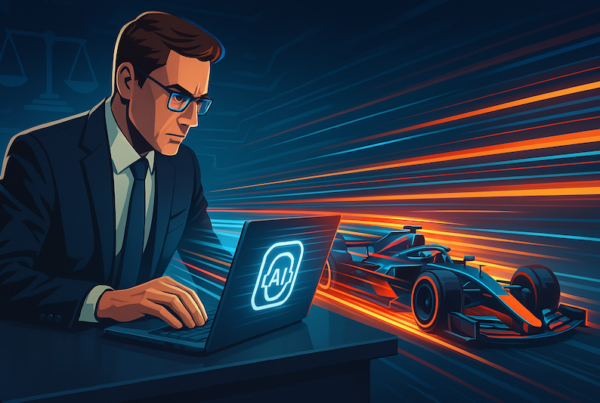Lawyers should always be looking for ways to improve their workflow and optimize their practice. One tool which may help attorneys achieve their goals is artificial intelligence (AI).
But how does AI in law firms work, and how is it changing our profession? Let’s consider what attorneys need to know to improve their practice and grow their firms.
What Is AI?
Artificial intelligence, or AI, is a tool we can use to replicate human behavior.
- AI systems “mimic” our actions to perform a whole range of tasks, from proofreading to content generation.
- We can “train” these systems to look for patterns, predict outcomes, and generate solutions.
- AI programs can be customized and scaled across businesses of all sizes. They’re highly diverse and flexible.
No matter whether you run a solo practice or a multinational firm, you can implement AI.
Examples of AI
AI has a huge range of applications across the legal profession. Here are just some examples of how you might use AI day to day.
- Sending emails
- Automated responses
- Chatbots and support
- Automatic reminders
- Digital dictation
- Automatic invoice generation
One of the best-known examples of AI in law is ChatGPT. ChatGPT is a content generation tool, and it can help with everything from writing emails to answering questions. To learn more about ChatGPT for lawyers, check out this article.
Benefits of AI in Law Firms
There are significant benefits to using AI in legal practice.
- Save time: AI can review, analyze, and edit documents far quicker than a human can.
- Improve efficiency: Task automation means your team can spend more time on high-value work rather than labor-intensive admin tasks.
- Increase accuracy: AI tools can’t be distracted. This laser focus reduces the likelihood of making mistakes, or overlooking a key error.
- Boost strategy: With AI, you can quickly find legal precedents, predict case outcomes, and build effective case strategies.
From personal injury to commercial litigation, AI can support lawyers working in every legal sector.
AI in Law Firms
Okay, so that’s how AI works and why it’s helpful. But how is it transforming legal practice – how are lawyers leveraging AI to their advantage? Here are three key ways that AI is changing the legal landscape.
1. Document Management
AI document management is hugely beneficial.
For one thing, it helps lawyers organize their online legal systems, so it’s easier to find documents. You can also maintain access privileges for security, store documents safely, and quickly share files across platforms like Microsoft.
And if you need help drafting documents? AI’s here for you. You can quickly generate templates, complete contracts, or fill in automated forms. From filing motions to producing letters, AI streamlines the process.
2. Litigation Support
Legal research for litigation is hugely labor-intensive. But with AI, you can quickly scan databases, pull relevant statutes, identify helpful case law, and predict outcomes.
The result? You can focus your time on building the most effective case possible. AI helps you strategize and deliver the results your clients are hoping for in the shortest amount of time.
3. Access to Justice
AI makes law more accessible to everyone. Lawyers can automate certain types of routine legal work, which saves money. They can pass these savings on to clients by reducing legal fees.
For example, say it took 16 hours to complete certain client billables. Now it might only take three with help from AI. Clients only pay for three hours.
In the meantime, you can retain more clients. You can make up for those lost billable hours because you’ve reduced your workload per client.
Can AI Replace Lawyers?
AI should help lawyers, not replace them. With AI, you can handle higher workloads. You can focus on client communication and delivering quality outcomes. You’re not being replaced – you’re making the technology work for you.
Could we ever have an AI lawyer in court? It’s possible. However, there are many issues to consider before courts can handle “robot” lawyers or courtroom AI.
For example, the technology behind AI is not yet legal in US courtrooms. And many lawyers may be resistant to the idea of leaving computers to do complex work. However, given the many benefits of AI, only time will tell if AI lawyers become a court feature.
Learn How to Automate and Organize Your Law Firm
AI is a timesaving tool that can revolutionize your practice. However, if you’re new to AI, I understand how overwhelming this tech can seem. But with the right support, you can easily make it work for your firm.
Want to learn more about ChatGPT for lawyers? Check out my free course: ChatGPT for Modern Lawyers.
Use technology to radically improve your law practice by focusing on the few core elements that have the biggest impact.







